David Simpson's Blog, page 5
March 27, 2012
Thank you. Edmund Charles! (Reader appreciation day 3)
Edmund Charles! Thank you so very much for your support! Edmund left a great 5 star review for Post-Human on amazon.com. You can read his review on Amazon here. Read Here
Edmund is also a blogger. He had mention both Post-Human and Trans-Human there. Check them out!
Post-Human: Click Here to read
Trans-Human: Click Here to read

Edmund is also a blogger. He had mention both Post-Human and Trans-Human there. Check them out!
Post-Human: Click Here to read
Trans-Human: Click Here to read

Published on March 27, 2012 20:03
Thank you. Evelyn Holmes! (Reader appreciation day 3)
Today's thank you goes to Evelyn Holmes! She wrote an amazing 5 star review on Amazon.com for Post-Human. You have no idea how good it feels when someone likes your work.
Thank you Evelyn!
Read review here: Click here

Thank you Evelyn!
Read review here: Click here

Published on March 27, 2012 19:33
March 25, 2012
Thank you. Angela Bond! (Reader appreciation day 2)
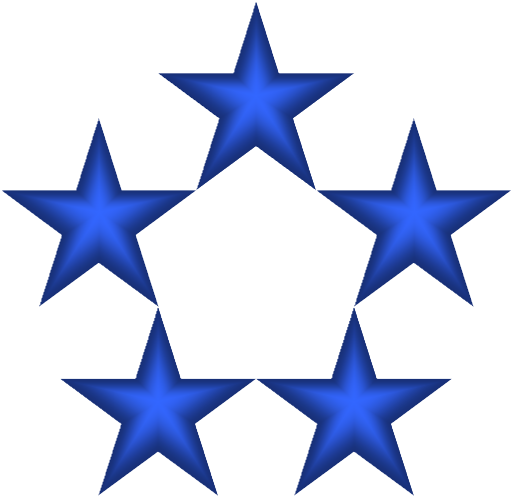
Day 2 of my 5 star thank you's. Angela wrote a nice review for me and it came at just the right time to pick up my spirits and get my sales going again. Thank you, Angela!
Read Review Here: Click Here

Published on March 25, 2012 20:26
March 24, 2012
Thank you. Curtis Hox! (Reader appreciation day 1)
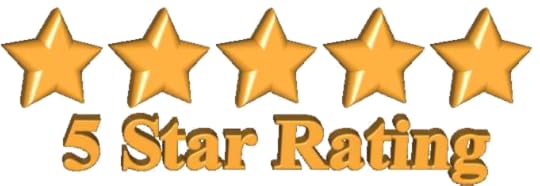
I said that I would be thanking individual readers on my blog and "like's page so I've decided to give shout outs to all of the wonderful readers out there that wrote 5 star reviews on Amazon.com or Amazon.co.uk. I will be thanking one a day for about the next month in the half, going back in time I think as I work my way though them. First up, fellow author Curtis Hox.
Read Review here:
http://www.amazon.com/review/R6ZC1DUJ6XBV6/ref=cm_cr_pr_perm?ie=UTF8&ASIN=1440136874&nodeID=&tag=&linkCode=

Published on March 24, 2012 20:33
Thank you. Curtis Hox! (Reader appreciation day 16)

I said that I would be thanking individual readers on my blog and "like's page so I've decided to give shout outs to all of the wonderful readers out there that wrote 5 star reviews on Amazon.com or Amazon.co.uk. I will be thanking one a day for about the next month in the half, going back in time I think as I work my way though them. First up, fellow author Curtis Hox.
Read Review here:
http://www.amazon.com/review/R6ZC1DUJ6XBV6/ref=cm_cr_pr_perm?ie=UTF8&ASIN=1440136874&nodeID=&tag=&linkCode=

Published on March 24, 2012 20:33
March 7, 2012
The Meaning of Life
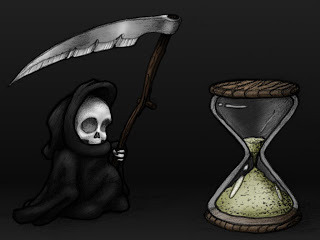
And death shall be no more; Death, thou shalt die! -- John Donne
Death does not give my life meaning.
Recently, Neil deGrasse Tyson was on Real Time with Bill Maher and was asked an audience question about which scientific breakthrough to which he was most looking forward. Maher jumped in and said, "Curing old age!" to which deGrasse Tyson replied, "I worry that if we live forever, we won't live our lives with such intensity."
He went on to relate an anecdote form Einstein in which the great inventor, allegedly, was given the possibility of survival if he agreed to an operation but refused, stating, "My work is done." I couldn't find that anecdote anywhere else other than in deGrasse Tyson's imagination, so I'm not willing to concede that it's true. Indeed, what I do know is that Einstein wanted to find a unified field theory -- quantum physicists like Stephen Hawking are still looking for this. Einstein's work wasn't done at all. What could he have achieved with another century? DeGrasse Tyson will tell you that Einstein would have sat on the couch eating Cheetos if he'd had an unlimited life span. "I can always do it tomorrow," was deGrasse Tyson's hypothetical mantra of the immortal. What baloney.
I happen to hope (and think) that I will be able to make it to a point in time in which my consciousness can become immortal. I've had that opinion now since 2005, when I was first exposed to Ray Kurzweil's The Singularity is Near and learned the detailed science behind the hypothesis. In the time since, I've completed a Master's thesis, I've been awarded teacher of the year by my English department at the University of British Columbia, I've coordinated a program to help underprivileged people attain education, I started a program to get graduate students in the arts to pair up with teachers in the community to help give students a better idea of what an arts education leads to, I've written 4 books (3 published, 2 of them Bestsellers) I'm planning to have written 7 books by the end of this year, and I've done all this while teaching full time. I'd say that I am living my life with intensity.
Ray Kurzweil is living his life with a heck of a lot more intensity than I. He's won the National Medal of Technology, he's in the Hall of Fame for Inventors, he has approximately 20 honorary doctorates, he's written several books, all of them nonfiction and all about life extension, he's a prolific public speaker and, oh yeah, he's still inventing things -- he holds 24 patents and the number continues to grow. He's the name most associated with immortality and life extension, and I'd say he's living a life on intensity.
On the other hand, Steve Jobs famously used his own death as a motivation. I wonder sometimes if that wasn't a self-fulfilling prophecy. We still don't know how mental states affect our physical health, but there appears to be a strong link between stress and depression and declining health. There's no way that anyone can say Jobs actually caused his illness by fixating on his own demise from a young age, but I think we can safely say it didn't help matters.
DeGrasse says he lives every moment of his life with meaning because he knows he will die. What? So, if you are going to die, your life becomes meaningful? Why? When you're dead, you're dead. Your accomplishments don't take on any more meaning because you died. People might celebrate them for a little while as they mourn you, as they did for Jobs, but you're not around to enjoy the show. I think we all would have liked to have seen what Jobs, Einstein, Tesla, Edison, and others of their ilk might have accomplished had they stuck around. Instead, we lost their talents, their years of experience, their intelligence, and their creativity.
Death isn't meaningful -- death is meaningless.
Here's what it boils down to: death does not give my life meaning. Life, gives my life meaning. I remain motivated because I want my life tomorrow to be better than it was today, and I want the same for the people around me and for all of the people of the world. Improving life and making the world better isn't something we push off to the next day because, "oh well, we'll get to it." Improving life is something we want to do today, because its up to us to make tomorrow better. Assuming that there is a magical being in the next realm who has set up a perfect world for us after we die is just plain lazy. If we want Heaven, we have to build it, and I don't know about you, but I don't want to wait for it. I don't want to push it off until tomorrow. I want it to come as soon as possible.
Life is the miracle. Life is meaningful. Not death.
Death needs to die.

Published on March 07, 2012 16:32
January 30, 2012
My First Day on Amazon Select (and Amazon Select versus Everything Else)
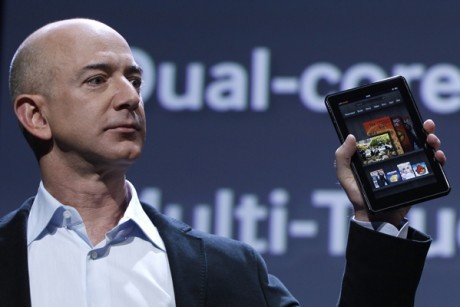
So, here are my thoughts on Amazon versus smashwords.com and basically all of the other platforms that are out there for writers:
I've gone completely indie for about two months now and, by far, most of my sales have come from Amazon. As of this writing (2:43 am on January 29th), I have sold roughly 250 books on Amazon, as opposed to 9 on smashwords.com -- I haven't sold any anywhere else. Therefore, at least in my case, I am selling about 25 copies on Amazon for every 1 copy I sell anywhere else.
When Amazon brought out the Kindle Select program, smashwords immediately posted a warning to authors that they should beware and, that makes sense from smashwords.com's perspective. After all, Amazon was requiring that their authors go exclusive for ninety days and that they not even sell their ebooks from their own websites. On the surface, this seemed draconian and the warning, along with many other warnings from indie writers who were put off by such a condition, kept me from joining the program.
I continued on my path, giving Post-Human away for free on every platform but unable to offer it for free on Amazon since Post-Human wasn't part of the Select program. Despite the fact that Post-Human was everywhere else, it continued to outsell my other two titles combined on Amazon at its 99 cent price point (my other two books are 99 cents as well).
Smashwords did offer me some excellent free exposure. In the 8 weeks that Post-Human was there for free, it was downloaded almost 500 times and it was marked as "to read" in almost 1500 member's libraries. It remained as the number 1 most downloaded cyberpunk book on smashwords for almost the entire time it was published on the site. It received some excellent reviews, with one reviewer even claiming that I was now his favorite author. Not too shabby, right?
Yet its sequel, Trans-Human, was only downloaded 9 times in 8 weeks.
Meanwhile, Amazon offered far more sales, though they plateaued almost immediately. In December I sold exactly 100 books. In January, I was on pace to sell slightly less. That was until I found a big piece to my book selling puzzle: visibility.
I recategorized my books into smaller categories, which is kind of like taking your book and putting it on a small table in a bookstore, rather than a huge shelf. While the shelf might attract more people overall, the smaller table attracts certain, specific people who are looking for certain, specific books. Therefore, your book has the chance to be a big fish in a small pond. For me, this category was Science Fiction Series, and Post-Human and Trans-Human quickly climbed into the top 30. This boosted my sales from 3 per day to about twelve and put me within range of selling 100 books in a week instead of a month.
After this modest but welcome success, I realized that I needed what only Amazon could give me -- even more visibility. In 8 weeks on smashwords.com, my free version of Post-Human wasn't quite able to garner 500 downloads. In the last two hours since Post-Human became free on Amazon, it has been downloaded 60 times (and it is 3 am!). I am expecting to be closing in on my 8 week total from smashwords.com by the time I wake up tomorrow morning.
Speaking of which, I should really finish this posting tomorrow when I have a better update. Just so the record is straight, my Amazon.com downloads as of 3:00 am were 119 (up from 69 before midnight), my Amazon.co.uk downloads were at 14 (up from 2) my Amazon.de were at 4 (up from 1) and Amazon.es was at 1 (up from 0). ***
*** Okay, so it has been 9 hours since I left off this writing, and Amazon.com downloads are now at 648, Amazon.co.uk are now at 58, and Amazon.de is at 22.
So, like I guessed, in less than half a day, Amazon gave me the same exposure that it took 8 weeks of having my book for free on smashwords.com to accumulate.
This has also pushed the sales of my other two novels up. It is modest, but my previous record for all 3 of my books in one day combined was 21. Trans-Human has already sold 15 today and The God Killers, which is notoriously lagging behind usually, has sold 8 -- and I still have 12 hours to go.
I will finish this posting tonight once I see the final results from my Amazon Select experiment. ****
Okay, it's now after midnight and, overall, I have to say Kindle Select has been pretty impressive. The final numbers after 24 hours were 1171 (up from 69, remember) on Amazon.com, 95 on Amazon.co.uk, and 35 on Amazon.de. So, in one day, I reached 1231 readers, almost tripling what it took 8 weeks to do on all of the other platforms with a free Post-human. Post-human also became the #1 book in both the sci-fi series category, as well as sci-fi high-tech, and it reached as high as #7 in sci-fi overall in the free kindle store. It also reached #267 in the free kindle store.
As added benefits, before my Select experiment, the best my books had ever sold in one day was 21 copies combined. Well, Trans-human alone sold 29 (and continues to see more after the 24 hour period ended) and The God Killers, my lagging middle child, sold 9, almost doubling its monthly output. Trans-human got as high as #10 in the paid sci-fi series store as well, which, for me, is quite an accomplishment and increased its overall visibility.
For these reasons, I decided to extend my free day on Kindle for another 24 hours. Although Monday is a notoriously bad day for selling ebooks and it might sound crazy to burn up a free day, I am trying to be bold, and since I was climbing the rankings at midnight, I opted to see what would happen if I kept going. So far, the results are pretty mixed. Although I am way up in the overall rankings, now reaching #209 in the free kindle store, the "sales" have been way slower since the new free period kicked in. It has been about 4 and a half hours as of this writing (yep, I am awake at 5:00 am) and only 80 copies of Post-human have been downloaded. 3 more copies of Trans-Human sold, however, so that is a positive.
So, my verdict is that, currently, Amazon just kills all of the other platforms combined in every way. If you're an author, I highly recommend signing up for the Select program -- after all, it is only 90 days if you don't like it and you want to switch back, and what do you really have to lose? I spent 8 weeks trying to get people to notice my free book and had limited results. In 24 hours, I blew those results out of the water and really got some excellent exposure.
My last thoughts on the subject are about the future (as I guess they should be as a sci-fi writer). It seems to me that, while some people may be gnashing their teeth at Amazon's dominance in the ebook game and will feel pity for their ebook competitors, that there is still room for competition. Amazon's 99 cent royalty rate is only 35 cents, and smashwords.com has a far more generous rate (depending on what platform your book sells in) of between 60 and 80 cents. As our e-readers get cheaper and cheaper, it is going to become more and more about the websites and applications that allow people to download books, and there is definitely room for someone to come in and offer writers a better rate for books that are under the $2.99 price point. So, while Amazon currently rules the day, for those pioneering e-publishers out there, I'd say, don't give up hope! Plan for a day in the near future where you can build a company that caters specifically to attracting authors will a higher royalty rate, and watch the authors, and eventually the readership, follow you there.

Published on January 30, 2012 06:06
January 15, 2012
The Plan for 2012.
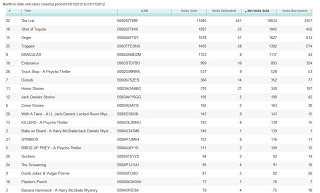 J.A. Konrath is now, like Amanda Hocking, one of my new heroes. I've been reading his blog after learning that Amanda Hocking was actually inspired by him when she decided to indie publish directly to Kindle. Although Joe isn't quite as successful as Amanda (he hasn't yet sold a million... only a paltry 600 000... cough) he just made $100 000 dollars in the last three weeks.
J.A. Konrath is now, like Amanda Hocking, one of my new heroes. I've been reading his blog after learning that Amanda Hocking was actually inspired by him when she decided to indie publish directly to Kindle. Although Joe isn't quite as successful as Amanda (he hasn't yet sold a million... only a paltry 600 000... cough) he just made $100 000 dollars in the last three weeks. Oh.
My.
GOD!
As he writes, it's time to pinch yourself. Could these numbers be real? Well, he put a screenshot up on his blog and, as you can see, he sold over 10 000 copies of his book, The List, in just the first 11 days of January. In comparison, I sold 13 copies of Post-Human over the same time period. Um. Yeah.
On January 11th, his book was number 75 paid in the Kindle store, so I now see that it requires approximately 1000 sales of a book in a day to crack the top 100... my record for all 3 books in one day is 8.
Joe is my hero.
I want 2012 to be my year. Here's my plan:
I'm working hard on my next ebook, which will be the first book that I publish directly to Kindle. As Joe advises his many blog readers, I'm experimenting with this one and writing something a little different than I have in the past. Rather than locking myself into one genre forever, I'm going to try different genres and see what works. The book I am feverishly hammering away at right now is a near future dystopia with vampires and zombies... that's right... vampires and zombies. And while I know many of my readers really, really didn't want me to write it, and even I had my reservations, I'm 1/3 into it now and, I have to say, it is really, really damn fun. I'm glad I wrote it. It might be a failure of galactic proportions, hated by the world, but at least I can say I tried.
In all seriousness though, it's going to be a very good book and I'll be proud to have it as part of my catalogue. When I am finished with it, I am on to the next one, and the next one, and the next one.
My goal is to have four more books published directly to Kindle by 2012 and to keep trying to grow my readership. I have a small goal of selling over 2000 books by the end of the year. If I accomplish that, I will consider it to be pretty much just treading water, but I will also be satisfied that, slowly but surely, I am reaching an audience. My reviews have been excellent, especially lately, and I am not going to give up.
So... what's your plan for 2012?

Published on January 15, 2012 12:54
December 19, 2011
MMA and hockey fights are neurologically unethical.
[image error]
I started a discussion that got heated on my wall a few months back about ending boxing and MMA as sports. Here's a medical journal editor with a similar view, calling for an end to fighting and head shots in hockey. Here's how the doc puts it:
"Still, many players insist that hard-hitting checks and fighting are just part of the fast-paced game and it's unrealistic to believe those aspects can be dissected out of the sport. Kale is aware of that attitude, but said he has a question for those players: "Do you want to be rich, famous and demented and dead at 40? "They need to think about that seriously. They must be clear in their mind that there is a huge risk in this for themselves.""
My argument has been that young men playing hockey, and young men training to seriously compete in MMA, by in large (and it's a good guess that 99% or more of them fall into this category) do not understand the risks, and do not understand that a concussion means permanent damage. MMA rewards permanently damaging one's brain for the entertainment of others. Not cool, Zeus. Not cool.
Those of us in the transhumanist movement can't ethically support MMA, and saying that MMA fighters are making an informed decision gives way too much credit to young guys who are rarely educated beyond high school. I'm not trying to diminish them; it took me until graduate school to start getting even an elementary grasp of neurology. The idea of MMA guys or hockey players sitting around reading neurology or psychology textbooks and then making an informed decision to fight is laughable.

Published on December 19, 2011 16:49
December 18, 2011
Traditional Publishers Are Already Dead
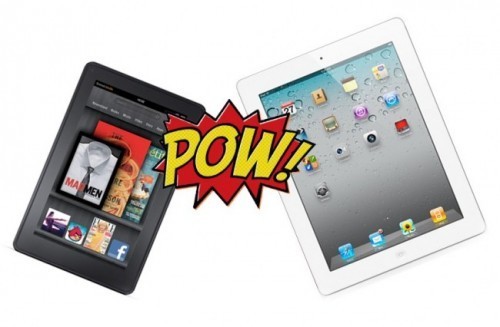
The most important thing you need to know is that traditional publishers do not have the inherent right to exist. They were necessary once, when the only way to reach a mass audience was with brick and mortar stores and mass-printed editions of one's work that were transported on trucks over roads or by air to stores throughout the world. But now they are nothing more than anachronistic leeches, jamming their proboscises into authors and consumers, desperate to suck out any drop of cash left in the rotting carcass that was the old publishing paradigm.
If you are a writer, you are now your own publisher. It's that simple. We don't need publishers anymore, and thank god they're on their way out the door. Here's why:
Traditional publishing is completely inefficient. Sarah MacLachlan, Publisher of Toronto's House of Anansi Press, was recently quoted as saying in regards to why publishers charge as much for an ebook as they do for a printed edition, that, "The strategy is to maintain value in what we produce, so whether that's the print book or the e-book, this costs 'x' to make and we need to maintain that to stay alive." Why does it cost so much to produce a book? Inefficiency. They charge money to design covers, to read manuscripts, and to maintain their old position as the gatekeepers of the literary universe, a power that they have abused and misused. When you break down MacLachlan's argument, it is simply that publishers cost a lot, so they should charge a lot. But should publisher's cost so much?
Amanda Hocking, as recently as May of 2010, was an unpublished author, having been rejected by 50 publishers, and she was living paycheck to paycheck on only one thousand dollars a month. Agents wouldn't even bother to read her work and it appeared that her dream of becoming a writer was doomed. However, luckily for Amanda, the world was changing drastically. Amazon had come out with an e-reader called the Kindle, and it was now possible for writers to self-publish their work exclusively for the reader and feature it on the Amazon.com platform. Amanda put her work online for the world, hoping to sell a handful of copies rather than letting her unpublished work rot in a corner somewhere in her apartment. In her first month, she was thrilled to sell a few hundred copies, but a month later, she sold 6 500 copies. That's right. And that was just the beginning. One month after that, she sold 10 000 copies, and in December of 2010, she sold 169 000 copies. In the last year and a half, she has made over 2 million dollars from e-publishing alone. All this from a girl that traditional publishers thought wasn't worth a second look.
Amanda's story should dispel a very destructive myth for you: that publishers somehow magically know what is good, what is not, and publish only what is good, and turn away only what is bad, a.k.a., what readers will not want to read. Yet, some of the best-selling books in recent history, Twilight and Harry Potter, were famously rejected by almost all of the publishing houses to which they were submitted; it is a minor miracle that those books were ever published at all. What other possible best-sellers have we missed, their authors giving up after countless rejections? The publishers as all knowing gatekeepers myth wasn't only believed by prospective writers and by the general public, but was believed by the publishing houses themselves, which began to look down on writers as a desperate, untalented lot that needed to be kept at bay while only the chosen few were allowed to pass through the gates of acceptability. What complete and utter garbage.
My own books, sci-fi and horror fare published through iUniverse (which is owned by Barnes and Noble) had been listed at between $13.95 and $15.95 for the paperbacks, yet the ebooks were listed at $9.99. In my view, $9.99 was a major deterrent for buyers of what is, essentially, an information file, and so, after the first month, my various books' sales plummeted, and had languished ever since in what was essentially "book death."
So, last month, after learning of Amanda's story, I decided to take my own novels, for which I still owned the copyright, and republish them independently. It was a very difficult process because I had to take my manuscripts and convert them into the ebook format by myself, but after a week of struggling to figure out how to make sure italics would appear properly, I was finally set. I set the price for all of my ebooks on Amazon.com at 99 cents, and then promoted on my Facebook, twitter, and goodreads.com accounts (as well on any book blogs that would help me) that my first novel, Post-Human, could be downloaded for free on my website. It hasn't even been four weeks yet, but my books are selling now, and selling everyday.
Post-Human has been downloaded thousands of times from my website and hundreds of times from smashwords.com (where it has only been for 6 days as of this writing) yet, despite the fact that it is free, it is actually outselling my other two novels, Trans-Human and The God Killers, on Amazon.com. I'm on pace to sell one hundred books this December, though I am expecting an uptick to push me well above that threshold after people open their newly minted e-readers and tablet readers on Christmas morning (not to mention their Amazon gift cards.) I don't know if, like Amanda Hocking, my sales will increase exponentially after that, remain steady, or just plummet, but what I do know is that I have an audience that I couldn't reach because of the publisher's overpricing, and that repricing my books worked.
The publishers would have rolled their eyes at my suggestion to lower the prices and told me that there just wasn't any interest in my books. That's what really burns me. They act as though they know, when they really don't. I'm a damn good writer, as is Amanda Hocking, and screw them for dismissing us. They do far more harm to writers and their careers than they do help (with the very small exception of the super successful Dan Browns and J.K. Rowlings of the world). This is because they don't want to be squeezed out of the process. They deride authors and cry foul to e-retailers because they don't want to accept the truth that they are unnecessary.
My point is, publishers are now an anachronism. Writers can write their books, find their own editing help, make their covers by themselves or employ someone to design it if they wish, and they no longer need the overpriced, self-important help of a publisher to get them where they need to be.
Agents and publishers are no longer the gate keepers. Yes, it's true that a great deal of crap may be published online, but Amazon and every other major retailer has a user rating system in place to rate if the books are good or not, and book blogger reviews have now become the standard by which readers judge whether or not a book is worth purchasing, not the New York Times book review. My books are reviewed very well online by readers, and readers trust other readers.
If you're in publishing, and haven't thrown down your tablet or computer yet in disgust about this article and in abject hatred of me, then please listen. There is still hope for you. Just because the literary world has changed doesn't mean that there isn't still a place for people who have a passion for books. First of all, have you considered trying to write yourself? Most people who are involved in publishing got into it because they were writers themselves, and you can e-publish competitively on the many platforms out there and take your crack at making it on the basis of your own work (rather than by simply judging others). Secondly, if promoting writers is really what you care about, there is still room for promotional services -- writers still need all the help that they can get to stand out above the crowd. Most books are just ignored by publishers after the first month unless the sales are robust, so writers have always found that they had to market the book by themselves anyway. You could offer your services to writers to give them a competitive edge. Third, what about creating your own ebook platform? Mark Coker started smashwords.com and the website collects just 20 cents on the dollar when authors publish their work there. Smashwords is a money making machine that adapted by realizing that a big change was on the horizon and getting into the game at the right time. Have you considered making the switch?
There is still opportunity out there for the people who work in publishing, but they have to realize that the days of being the gatekeepers, of looking down at authors and tossing out unsolicited manuscripts, is over. Writers are now in control of their own destiny, having created a new relationship with e-retailers that rewards the reader with cheaper prices. The only one left out in the cold is the traditional publisher and thank goodness. They do not have the inherent right to exist. Like everyone else, they have to adapt or die, and they have to, above all else, stop sucking on the blood vein that is creative writing talent.

Published on December 18, 2011 17:53























